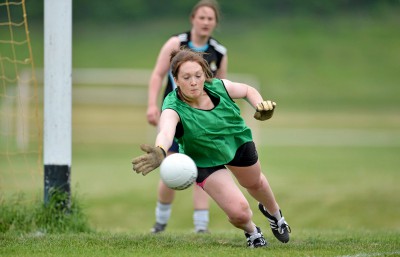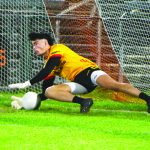By Patrick Morrison
WHENEVER a goalkeeper is performing during competition and performing during training sessions, they do so with two completely different approaches.
The mindset a goalkeeper will have when they are performing during competition will greatly differ to the mindset they will apply when they are training. During competition the goalkeeper has a greater need to have intense focus and concentration on their performance, whereas during training this intensity lessens which then allows for a more pragmatic and methodical attitude with the aim of improving overall performance.
Goalkeepers complete training sessions prior to competition as a rehearsal for performing well in games. With this mindset towards training, it allows the goalkeeper confidence in making errors or mistakes as they train.
These become the learning experience that they require for them to improve their performance in those areas being targeted in each training session.
It is because of this reason that training will always feel more mistake ridden than competitive matches because the goalkeeper is using their ‘training brain’ to make decisions. Their training brain purposely allows the ‘keeper to make affordable mistakes in the pursuit of overall progression.
During competition, the skills and abilities the goalkeeper is using are exactly the same as they are completed in training. The main difference between the two is the amount of psychological pressure that accompanies completing these skills in a competitive environment.
In this situation the goalkeeper’s ‘competition brain’ takes charge and processes the psychological stresses appropriately. The more that a goalkeeper learns about how exactly their mind takes over during competition, the easier it becomes to execute their skills under pressure, and we call this consistency.
Kirsten Differenbach, a sports psychologist who works for the US Olympic Committee, stated in an interview that “On any given day, water is still wet, the track is still there, and gravity still works the same way. It’s not like you’re going to get to an Ironman and there will be some extra element, like they added sharks to the water.”
She discussed how other competitors are not going to turn up with any additional elements that are going to create extra difficulties for you to perform your skills competently. Instead, she explains that the heightened levels of pressure are actually created by us and are created within our own minds ultimately showing themselves as nervous energy.
Nervous energy is merely the fear of unknown or undetermined outcomes that have not materialised yet. Learning to control this nervous energy and channel it into our performance is a key component of the competition brain of a goalkeeper.
When training it can be easy for a goalkeeper to switch off and begin to focus on other things rather than the exercises they are supposed to complete during the session. Training becomes lax and an increase in the number of mistakes becomes inevitable. This is not the focus and concentration of someone who is using their training brain.
When a ‘keeper is using their training brain during a session they become actively engaged in the session both by accepting feedback as well as providing it for themselves and their coach. They connect mentally with their coach and have a solid understanding of the purpose of the session or exercise and perform accordingly.
The goalkeeping position uses both physical and mental aspects of performance so ensuring that the goalkeeper uses their training brain correctly during each session is essential for their development.
The training brain is the dress rehearsal for the competition brain to take over when the pressure of competition arrives.
Ultimately, the confidence of any goalkeeper comes from having a strong training brain as the competition brain then has complete confidence in completing skills under pressure. It knows that the training brain has completed the necessary training for the goalkeeper to perform under pressure to a competent standard.
Whenever the goalkeeper expresses a lack of confidence in a specific part of their game you will usually find that the training brain needs better focus and concentration in that area.
Competitive games are a different experience in comparison to training. Yes, their elements are similar in nature, but the stakes are now much higher. Mistakes during competition now have the potential to have catastrophic outcomes in terms of performance, results and progression to the next rounds of the competition.
This intensified pressure causes the body to become stressed, causing the body to release stress hormones flooding the muscles which, in turn, makes them become tense and tighten up raising the expression ‘he/she froze in the heat of battle.’
One of the main side effects of using the competition brain is that it is exhausting because the mental stress eats up the goalkeeper’s energy even though they may not be moving or physically exerting much during the game.
The integration between the goalkeeper’s mental and physical self means that any mental drain on the goalkeeper will ultimately also manifest as a physical drain, thus creating fatigue. The intense pressure that accompanies competition will never be removed.
What is then important for the goalkeeper in order to ensure that they are fully prepared for these heightened levels of stress, is that they create a strong training brain by replicating the stresses or pressures experienced during competition in their training session.
This will allow the training brain to form valuable experience performing skills under this heightened form of pressure so that whenever the competition brain takes control they already have the mechanisms present to process the stress in a positive manner allowing the goalkeeper to perform competently in a competitive environment.
T: 07955 621 872
E: pmgoalkeeping@hotmail.com
Check out our analysis and reaction from Errigal Ciaran’s win over Kilcoo.
Receive quality journalism wherever you are, on any device. Keep up to date from the comfort of your own home with a digital subscription.
Any time | Any place | Anywhere















